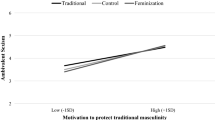Abstract
This study used an untreated sample of husbands and wives to investigate the effect of a wife's employment status on her spouse's depression score. A consistency between attitudes toward appropriate sex-role behavior and actual situation was expected to enhance mental well-being. Data demonstrate that when a measure of sex-role attitudes was paired with situation, it was a significant indicator of depression scores for unemployed females. Housewives with liberal views toward sex roles felt more restricted and were more depressed than were traditional housewives. Sex-role orientation was not effective in explaining depression scores for working wives or for husbands in the sample. The findings emphasize the necessity for examining the impact of sex-role orientation on depression both by sex and by situation.
Similar content being viewed by others
References
Acock, A., & Edwards, J. Egalitarian sex-role attitudes and female income. Journal of Marriage and the Family, 1982, 44, 581–589.
Aneshensel, C., Frerichs, R., & Clark, V. Family roles and sex differences in depression. Journal of Health and Social Behavior, 1981, 22, 279–393.
Booth, A. Wife's employment and husband's stress: A replication and refutation. Journal of Marriage and the Family, 1979, 30, 645–650.
Burke, P., & Weir, T. Relationship of wive's employment status on husband, wife and pair satisfaction and performance. Journal of Marriage and the Family, 1976, 38, 279–287.
Dohrenwend, B., & Dohrenwend, B. Social status and psychological disorder: A causal injury. New York: Wiley & Sons, 1969.
Dohrenwend, B., & Dohrenwend, B. Social and cultural influence on psychopathology. Annual Review of Psychology, 1974, 25, 417–459.
Felton, B., Brown, P., Lehmann, S., & Liberatos, P. The coping function of sex-role attitudes during marital disruption. Journal of Health and Social Behavior, 1980, 21, 240–248.
Fishbein, M., & Ajzen, I. Belief, attitude, intervention and behavior: An introduction to theory and research. Reading, Mass. Addison-Wesley, 1975.
Fox, J. Gove's specific sex-role theory of mental illness: A research note. Journal of Health and Social Behavior, 1980, 21, 260–267.
Goldman, N., & Ravid, R. Community surveys: Sex differences in mental illness: In M. Guttentag, S. Salasin, & D. Belle (Eds.), The mental health of women. New York: Academic Press, 1980.
Gove, W. Sex roles, marital roles and mental illness. Social Forces, 1972, 51, 34–44.
Gove, W., & Geerken, M. The effect of children and employment on the mental health of married men and women. Social Forces, 1977, 56, 66–76.
Hodge, P., Siegel, P., & Rossi, P. Occupational prestige in the United States, 1925–63. American Journal of Sociology, 1964, 60, 286–302.
Keith, P., & Schafer, R. Role strain and depression in two-job families. Family Relations, 1980, 29, 483–488.
Kerlinger, F. Foundations of behavioral research, 2nd ed. New York: Holt, Rinehart & Winston, 1973.
Kessler, R., & McRae, J., Jr. The effect of wive's employment on the mental health of married men and women. American Sociological Review, 1981, 27, 216–227.
Makosky, V. Stress and the mental health of women: A discussion of research and issues. In M. Guttentag, S. Salasin, & D. Belle (Eds.), The mental health of women. New York: Academic Press, 1980.
McGuire, W. The nature of attitudes and attitude change. In G. Lindzey & E. Aronson (Eds.), Handbook of social psychology, Vol. 3, 2nd ed. Reading, Mass.: Addison-Wesley, 1969.
Pearlin, L. Sex roles and depression. In N. Datan & L. Ginsberg (Eds.), Life span development psychology: Normative life crises. New York: Academic Press, 1975.
Radloff, L. Sex differences in depression: The effects of occupation and marital status. Sex Roles, 1975, I, 249–265.
Radloff, L. The CES-D scale: A self-report depression scale for research in the general population. Journal of Applied Psychological Measurement, 1977, 1, 385–401.
Radloff, L., & Rae, D. Susceptibility and precipitating factors in depression: Sex differences and similarities. Journal of Abnormal Psychology, 1979, 88, 174–181.
Roberts, R., & O'Keffe, S. sex differences in depression re-examined. Journal of Health and Social Behavior, 1981, 22, 394–399.
Rosenfield, S. Sex differences in depression: Do women always have higher rates? Journal of Health and Social Behavior, 1980, 21, 33–42.
Rosenkrantz, P., Vogel, S., Bee, H., & Broverman, I. Sex-role stereotypes and self-concepts in college students. Journal of Consulting and Clinical Psychology, 1968, 32, 287–295.
Rushing, W. Class, culture, and “social structure and anomie.” American Journal of Sociology, 1971, 76, 857–872.
Spence, J., Helmreich, R., & Stapp, J. Ratings of self and peers on sex-role attitudes and their relation to self-esteem and conceptions of masculinity and femininity. Journal of Personality and Social Psychology, 1975, 32, 29–39.
Spitze, G., & Waite, L. Wive's employment: The role of husbands' perceived attitudes. Journal of Marriage and the Family, 1981, 43, 117–124.
U.S. Department of Health, Education and Welfare. Basic data on depressive symptomatology, Series 11, No. 216, DHEW Publ. No. 80-1666.
Weissman, M., & Klerman, G. Sex differences and the epidemiology of depression. Archives of General Psychiatry, 1977, 34, 98–111.
Weissman, M., & Paykel, S. The depressed woman/a study of social relationships. Chicago: University of Chicago Press, 1974.
Author information
Authors and Affiliations
Rights and permissions
About this article
Cite this article
Kingery, D.W. Are sex-role attitudes useful in explaining male/female differences in rates of depression?. Sex Roles 12, 627–636 (1985). https://doi.org/10.1007/BF00288182
Issue Date:
DOI: https://doi.org/10.1007/BF00288182




